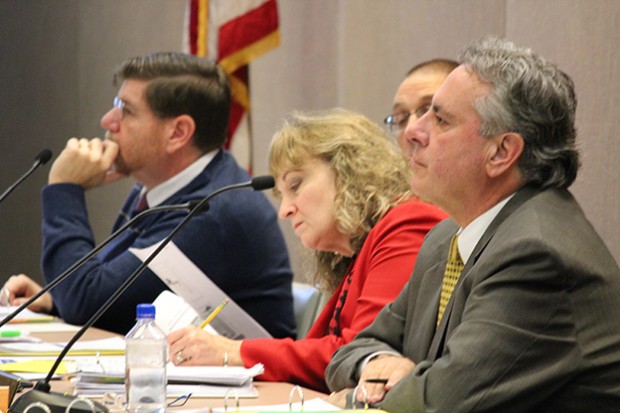Indiana Won’t Factor Achievement Gaps Into School Rankings This Year

State Board of Education members state superintendent Glenda Ritz and Dr. David Freitas listen to presentations at a January 2015 board meeting. (Photo Credit: Rachel Morello/StateImpact Indiana)
Update 10/5/2016 at 11 a.m.: The board passes the proposed resolution.
This year’s school rankings will not consider achievement gaps for economically disadvantaged students, students of color, students with disabilities or students with limited English.
The Indiana State Board of Education voted Wednesday to suspend part of Indiana law that requires schools to show progress in closing these gaps to receive an “A” ranking in the state’s A-F system. It’s the only reference to achievement gaps in the law, which governs how the state assesses schools and districts.
This year, Indiana doesn’t need to provide progress in closing achievement gaps — differences in student learning between certain groups and their peers — to the federal government. So, the state won’t ask local schools to provide any of this information for 2015-16 school rankings.
Indiana is in the process of developing long-term achievement goals for students that will align with the new ISTEP+ test and a new federal education law.
State Board of Education Spokesman Josh Gillespie says state officials intended to continue submitting achievement gap progress during the transition, but were advised by the federal department to postpone until new goals are developed. Once goals are developed, the state is required to submit each student subgroup’s progress toward closing achievement gaps.
“That resolution is just for this year,” said Joshua Gillespie, a state board spokesman, in an email.
This is one of many policy adjustments the state may make as it transitions to a new federal education law. The Every Student Succeeds Act replaces President George W. Bush’s No Child Left Behind and transfers much power over education policy from the federal government to the states.
Gillespie says the board is following a set of federal guidelines for the transition.
ESSA requires states to “establish ambitious State-designed long-term goals … for all students and separately for each subgroup of students,” instead of reporting achievement gap progress for economically disadvantaged students, students of color, students with disabilities and students with limited English to the federal level.
The federal guidelines still require states to publish state- and district-level report cards that show how subgroups of students in the state compare to the student body as a whole.
The state board will also consider adjustments to the SAT score graduation requirement, approval of adult high school accountability grades and hear a progress report on Indianapolis intervention schools.
Follow our reporters @PBalonon_Rosen and @ClaireMcInerny for updates.
CORRECTION: An earlier version of this article incorrectly stated that states would no longer need to report achievement gap progress to the federal government under ESSA. That is incorrect. Once new learning goals are developed, the state remains required to submit each student subgroup’s progress toward closing achievement gaps. We regret the error.